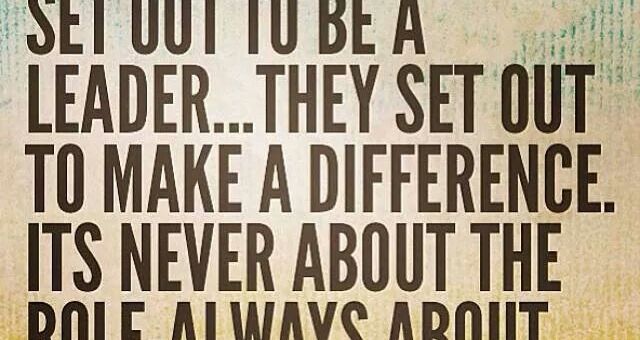How to Exercise Leadership When You’re Not in Charge
Are you letting your lack of authority paralyse you? One of the greatest myths of leadership is that you must be in charge in order to lead. Great leaders don’t buy it. Great leaders lead with or without the authority and learn to unleash their influence wherever they are.
Most of us believe that “leaders” are people who occupy certain roles that come with some sort of official authority. At every stage of your career, and throughout life in general, you will be challenged to lead when you’re not really in charge. This is the nature of human systems. And learning how to do this well is what separates those who surpass their peers and go on to lead their own business units or companies, from those who squander their potential as middle managers.
Yet, when we say people “rise to the occasion” or “take the lead,” we are basically saying that people with no official authority sometimes go beyond what’s expected of them and exercise leadership.
Here are five ways to exercise leadership when you’re not in charge…
1.) Master Self Leadership
This is critical. The ability to manage and lead yourself transcends beyond measure. How can this be achieved – self discipline my friends. Micro speed, macro patience. Let me explain..Be calm on the surface and paddle like crazy underneath. Get shit done in the bigger scheme of things, display the necessary patience required until you are duly recognised.
Nothing so conclusively proves a mans ability to lead others more than how how he leads himself. Thomas J Watson
Common misconceptions have led us to believe that great leaders are born. Keep in mind that every leader today was once a great follower. So lead yourself well, Practice self-discipline. Nurture patience. Hold yourself to a higher standard than you hold others. Read books. Hold yourself accountable. And learn how to be a follower.
Great leaders understand the world followers live in and what it is like to be under authority. So they have a better idea of how authority should be exercised. They understand their staff and congregation because they have walked in their shoes.
So, learn the art of followership. It is essential for great leadership.
2.) Display Positivity
This will not only bring massive change to your life, but to those around you as well. Positivity breeds positivity.You going to have days whereby your energy is zapped, instead motivate and inspire others to perform well. Be that person. It beats being the Debbie downer. Charles dickens said it best, “The sun himself is weak when he first rises, and gathers strength and courage as the day gets on.”
Great leaders are mindful of their language, do not get caught up allowing office negativity to impact your psychological state.
When you are not in charge, the natural response is to be cynical. “I could do that better. They don’t know what they are doing.” You get the idea. This is why positivity is ultimately a fight for “we” over “me” and “us” over “them.”
Choose to be outrageously positive. In everything you do…Full stop.
3.) Think critically
Critical thinking is the use of those cognitive skills or strategies that increase the probability of a desirable outcome. It is used to describe thinking that is purposeful, reasoned, and goal-directed – the kind of thinking involved in solving problems, formulating inferences, calculating likelihoods, and making decisions … it’s the kind of thinking that makes desirable outcomes more likely.
“It is the mark of an educated mind to be able to entertain a thought without accepting it.”—Aristotle
Do you want others to succeed?
Critical thinkers always want others to succeed. Cynics hope everyone fails.
4.) Take Initiative
There is nothing more crippling to an organisation than passive leaders. And if you are not in charge, the default is to be passive.
But if you want to be a great leader, don’t buy into this crap. Get to work. Don’t wait on someone to give you orders. Take initiative. I have seen this working with young leaders and interns. The most productive leaders don’t need me to constantly tell them what to do. They don’t need checklists. They figure it out.
Taking initiative may make you feel uncomfortable since you’ll often be forced to step outside your comfort zone, but, why not get comfortable with being uncomfortable and be one step ahead? Challenge yourself to take initiative and be proactive today.
Don’t wait for others to tell you what to do. Be an initiator.
5.) Understand that leadership does not require a title
If you are a young leader and you believe you must be in a position of authority to have influence, you don’t understand leadership. Leadership is cultivating influence wherever you are. If you have to leverage positional authority to gain influence, you are not a good leader.
Titles say nothing about earned authority. Authority, influence, trust and impact all take time. And you don’t always see it developing around you. This requires a level of faith in the overall process that can be hard for young leaders. It’s especially hard because young leaders assume that a title will be a shortcut (even when it’s not).
So be consistent. It may take time, months and years, and then suddenly, overnight, you’ll have the authority you were hoping for.
Leadership is less about the position you hold
than the influence you have. It’s about doing
world-class work, playing at your peak,
and leaving people better than you found them.
It’s about Leading Without a Title.
~ Robin Sharma
Maybe you have some points I did not mention. Maybe you have learned some things when you were not in charge that helped you become a great leader. Let’s keep the conversation going. I’d love to hear your ideas…
…











